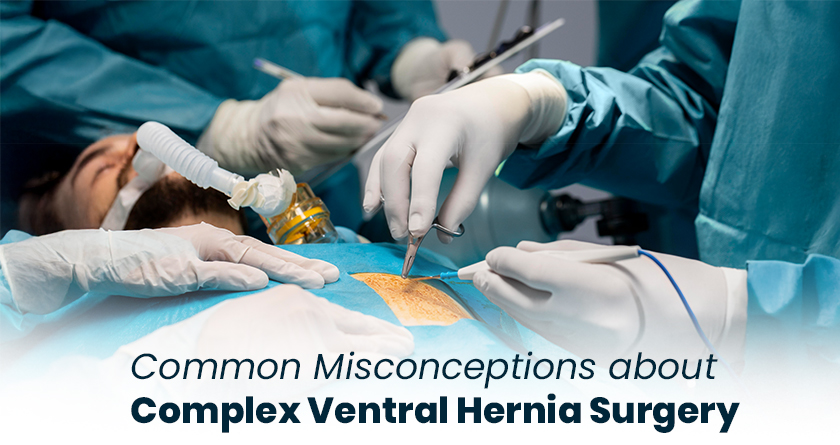Complex ventral hernia is a kind of health disorder where the abdominal tissues or organs are pushed out of the body due to the weakening of the muscles usually as a result of prior surgery or infection. Despite the fact that nowadays surgical treatment is more effective and safe, numerous myths are still related to the complex ventral hernia surgery. Such myths may conceal the patient access to care promptly or may lead to undue anxiety. This blog clarifies the most widespread misconceptions about complicated ventral hernia surgery, and reveals the facts behind them.
Myth 1: All Hernias Are the Same
Most of the people believe that hernias of all sizes and complexity can be treated in a similar manner which is not true. A complex ventral hernia is much more difficult compared to a simple hernia since it is often characterized by big defects, scar, or previous failed mesh repair. Depending on the severity and location of hernia, general health of the patient, the approach and recovery of the patient is different. Multifaceted ventral hernias need well trained surgeons and a clear preoperative plan to be successful.
Myth 2: Surgery Is Always Risky and Should Be Avoided
There are patients who delay the treatment based on the fear that complex ventral hernia would be too risky during the surgery. Nevertheless, the consequences of not operating can be devastating including intestinal obstruction or even strangulation. Current operative practices, such as those of laparoscopy surgery or robotic-assisted surgery have greatly minimized the risk, enhanced accuracy and shortened the period of operation and hospital stay. Complex ventral hernia surgery is safe and effective when carried out by competent surgeons in well equipped hospitals.
Myth 3: Mesh Repairs Always Cause Problems
One of the most misconceived factors of hernia repair is the use of mesh. Although initial types of synthetic meshes were problematic, modern medical grade meshes are made to blend with body tissues with ease. Mesh is used to reinforce the abdominal wall and decrease the possibility of relapse. With mesh is placed in the right place and when in sterile working conditions and done by qualified people, complications are unlikely. Different kinds of meshes are selected by surgeons with lots of care based on the condition of the patient.
Myth 4: Recovery Takes Several Months
As a matter of fact, there has been a reduction in the recovery period due to improved methods in operations and postoperative treatment. Within few weeks most patients are able to engage in light activities and then resume normal life gradually. Early ambulation, physical therapy, and correct wound care aids in a quicker recovery. Rehabilitation can take a long time depending on the general health of the patient and the extent of the surgery, but long term immobility is uncommon.
Myth 5: The Hernia Will Recur No Matter What
Although it can be recurrent, it is not unavoidable. Surgical repair, the use of good quality mesh and adherence to postoperative guidelines can significantly lower the recurrence rates. Pressure on the abdominal wall may also be prevented by maintaining a healthy weight, avoiding heavy lifting, and treating chronic cough or constipation. The most effective way of ensuring long-term results is by selecting a skilled surgical team and undergoing follow up consecutively.
Myth 6: Non-Surgical Treatments Can Fix Complex Ventral Hernia
Some people attempt to correct complex ventral hernias by using exercise, abdominal belt or homemade solutions. Regrettably, the structural defect in the abdominal wall cannot be fixed using these techniques. They can give short-term relief but will not prevent the worsening of the hernia. The only effective method of repairing a complicated ventral hernia is surgery which can avoid major complications.
Conclusion
The surgery on complex ventral hernia has developed significantly over the past few years and could provide the patients with effective, efficient and long-term results. The misunderstandings among general public is usually due to old information or fear of the unknown. The knowledge of the reality regarding the procedure will allow patients to make good decisions and be confident about treatment. Through advanced surgical methodology, a highly qualified surgeon and adequate post surgical support, majority of patients recovers well and lead a better life after surgery of complex ventral hernia repair.


